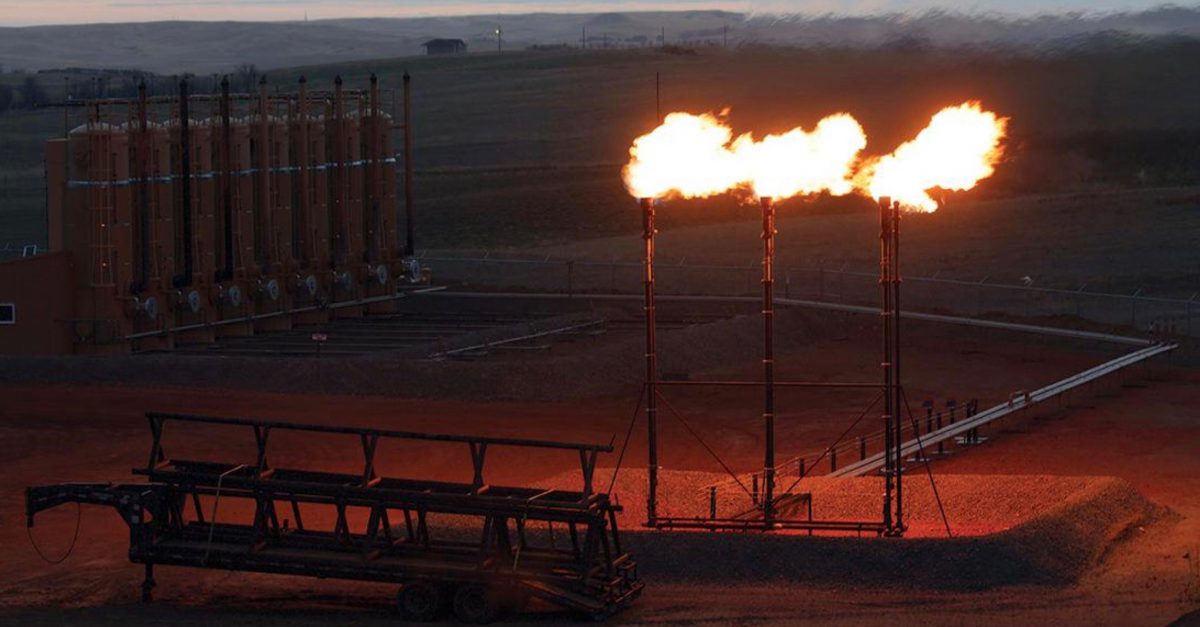It’s called ‘flaring,’ the process when oil and gas companies burn off excess natural gas instead of storing it.
Videos by Rare
Oil companies burn money by flaring off gas – but there IS a better way http://t.co/zzg9pZXYWF pic.twitter.com/gw3YJCax4I
— New Scientist (@newscientist) March 25, 2015
RELATED: Several Texas Oil Workers Injured, One Missing After Two Separate Incidents Rocked the Industry
According to some environmentalists, they claim this practice wastes potential energy and releases pollutants into the air.
Backing up their concerns, a new report by the Environmental Defense Fund (EDF) claims gas companies in the Permian shale basin in Texas are staging way more flare ups than they should be.
Billions of cubic feet of natural gas are reportedly produced in the Permian basin every day, but, instead of sending to storage, some companies choose, or, in some instances, may be forced to burn it off.
According to the EDF report on flaring, Texas companies in the Permian basin are burning off close to 10 percent of their total natural gas output.
Despite the crudely high amount of oil being produced in the West Texas region, conservationists maintain even this 10 percent is a concerning amount of wasted energy and include threats to the environment, such as carbon dioxide, particulate pollution and methane.
Contextualizing their claims, the EDF studies found other states flare on average less than one percent of their natural gas output; in 2015, 45.5 billion cubic feet of gas went up in smoke, enough to power thousands of homes for years, according to the fund.
According to its report, based on the amount of flaring, two thirds of energy companies working in the Permian basin may be more concerned with extracting as much oil as possible, as quickly as possible, rather than air quality and the impacts of their totally legal burn off practice.
Based on another agenda-driven environmentalist’s group’s clean air task force study, this not only affects the environment, but the people who live in the basin area, where seven of the top 10 counties in the U.S. for asthma attacks are located.
Similarly reflecting bias of their mission statement to “reduce carbon output,” the EDF released a number of guidelines they recommend for reconciliation of the releases they consider concerning, including treated wasted gas as a viable resource, doing away with permanent flaring permits and requiring technological updates to drilling sites.
Of course, flaring is approved by the government and remains a prevalent, safe and standard practice for many oil and gas refineries in the Houston area; while these companies could capitalize from the energy at sale, burn off occurs as part of their operations, including maintenance, pressure stabilization and during emergency situations.
It’s also a common, unconcerning site in Houston.
RELATED: Texas’ Oil Output Matches That of Some OPEC Member Countries
Geologist agree there are potentially billions of barrels untapped in the Permian.
With production ramping up, some believe these findings indicate a tightening up regulations on flaring and venting could be better implemented sooner than later.
Fueled by higher commodity prices and oil field activity, the Texas Permian Basin Petroleum Index is on the rise…. https://t.co/LUOPGbgCcb
— Stingray Energy (@Stingray_Energy) October 26, 2017



